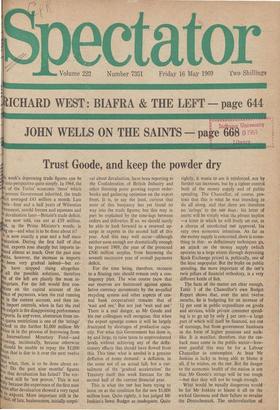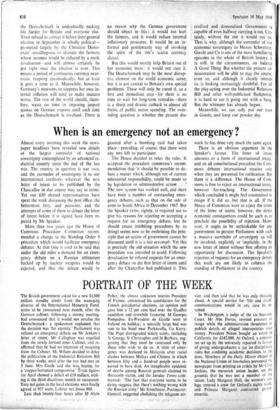Trust Goode, and keep the powder dry
s week's depressing trade figures can be into perspective quite simply. In 1964, the of the Tories' economic 'mess' which e present Government inherited, the trade 4cit averaged £43 million a month. Last onth—four and a half years of Wilsonian vernment, untold freezes and squeezes and e devaluation later—Britain's trade deficit, are now told, ran out at £59 million.
at, in the Prime Minister's words, is rIg on—and what is to be done about it? It is now exactly a year and a half since valuation. During the first half of that od, exports rose sharply but imports in- eased almost as much. Over the past nine tiths, however, the increase in imports been very gradual indeed—but ex- 'Ls have stopped rising altogether.
all the possible solutions, therefore use of the left are plainly the most in- Propriate. For the left would first con- trate on 'the capital account of the lance of payments, when the real running e is the current account, and then im- e import controls, when in fact the real de culprit is the disappointing performance exports. In any' event, abstention from im- rt quota restrictions is one of the 'strings' ached to the further $1,000 million Mr kilts is in the process of borrowing from International Monetary Fund—and crowing, incidentally, because otherwise should be unable to repay the $1,000 Ilion that is due to it over the next twelve gut what, then, is to be done about ex- tts? Do the past nine months' figures ve that devaluation has failed? The ver- , Must still be 'not proven.' This is not Ply because the experience of the first nine ilths after devaluation showed a very rapid cal about devaluation, have been reporting to the Confederation of British Industry and other listening posts growing export order- books and gathering optimism on the export front. It is, to say the least, curious that none of this buoyancy has yet found its way into the trade figures; but this may in part be explained by the time-lags between orders and deliveries. If so, we should surely be able to look forward to a renewed up- surge in exports in the second half of this year. And this may well occur—although neither soon enough nor dramatically enough to prevent 1969, the year of the promised £500 million surplus, from becoming the seventh successive year of overall payments deficit.
For the time being, therefore. recourse to a floating rate should remain only a con- tingency plan. The wise course (now that our reserves are buttressed against specu- lative currency movements by the so-called recycling system and other aspects of cen- tral bank cooperation) remains that of 'wait and see.' But not just 'wait and see.' There is a real danger, as Mr Goode and his IMF colleagues well recognise, that when the export upsurge comes it will be largely frustrated by shortages of productive capa- city. For what this Government has done is, by and large, to raise taxes to unprecedented levels without achieving any of the defla- tionary effects that should have flowed from this. This time, what is needed is a genuine deflation of home demand : a deflation, in the sense not of an actual fall, but a cur- tailment of the 'gradual acceleration' the Treasury itself this week forecast for the second half of the current financial year.
This is what the IMF has been trying to insist on as the condition for the new $1,000 million loan. Quite rightly, it has judged Mr Jenkins's latest Budget as inadequate. Quite rightly, it wants to see it reinforced, not by further tax increases, but by a tighter control both of the money supply and of public spending. The Chancellor, of course, pro- tests that this is what he was intending to do all along, and that there are therefore no 'strings' to the IMF loan : his letter of intent will be simply what the phrase implies —a letter in which he will freely set out, to a chorus of unsolicited IMF approval, his very own economic intentions. As far as the money supply is concerned, there is some- thing in this : as deflationary techniques go, an attack on the money supply (which operates to a large extent through depressing Stock Exchange prices) is, politically, one of the least unpopular. But the brake on public spending, the more important of the IMF'S twin pillars of financial orthodoxy, is a very different kettle of fish.
The facts of the matter are clear enough. Table 3 of the Chancellor's own Budget Report shows that, over the next twelve months, he is budgeting for an increase of l per cent in public expenditure on goods and services, while private consumer spend- ing is to go up by only per cent—a large part of which will itself be financed, not out of earnings, but from government handouts in the form of higher pensions and such- like. It is manifest, therefore, that the cut- back must come in the public sector—how- ever painful this may be for a Labour Chancellor to contemplate. At least Mr Jenkins is lucky in being able to blame it all, if he wishes, on the IMF. But the danger to the economic health of the nation is not that Mr Goode's strings will be too tough —but that they will not be tough enough. the Deutschemark is undoubtedly making life harder for Britain and everyone else. Their refusal to correct it before their-general election in September is wholly political— prompted largely by the Christian Demo crats' unwillingness to alienate the -farmers whose incomes would be reduced by a mark revaluation—and will almost certainly be put right once the election is over. This means a period of continuous currency near- crisis. erupting spasmodically: but at least it puts a term to it. Meanwhile, however, Germany's measures to suppress her own in- ternal inflation will tend to make matters worse. The rest of the world should., there- fore, waste no time in imposing .import quotas on German exports until such time as the Deutschemark is revalued. There is no reason why the German government should object to this: it would not hurt the farmers, and it would reduce internal inflationary pressures. It would be an in- formal and gentlemanly way of invoking the spirit of the IMF'S scarce currency clause.
But this would merely help Britain out of her economic mess: it would not cure it. The Deutschemark may be the most disrup- tive element on the world economic scene, but it is not central to Britain's own special problems, These will only be cured if, as a first and immediate step—for there is no time to wait for long-term remedies—there is a sharp and drastic cutback in almost all forms of public sector spending. The over- riding question is whether the present dis- - credited and demoralised Government is capable of even halfway carrying it out. Cer- • tainly, without the IMF it would not be. That is why, although the surrender of our economic sovereignty to Messrs Schweitzer, Goode and Co is one of the most humiliating episodes in the whole of British history, it is still, in the circumstances, on balance A Good Thing. But whether the present ad- ministration will be able to stay the course, even so, and although it clearly intends to, is looking increasingly doubtful. For all the play-acting over the Industrial Relations Bill and other well-publicised flashpoints, it is hard to see it going out with a bang. But the whimper has already begun.
Meanwhile, we can only put our trust in Goode, and keep our powder dry.







































 Previous page
Previous page